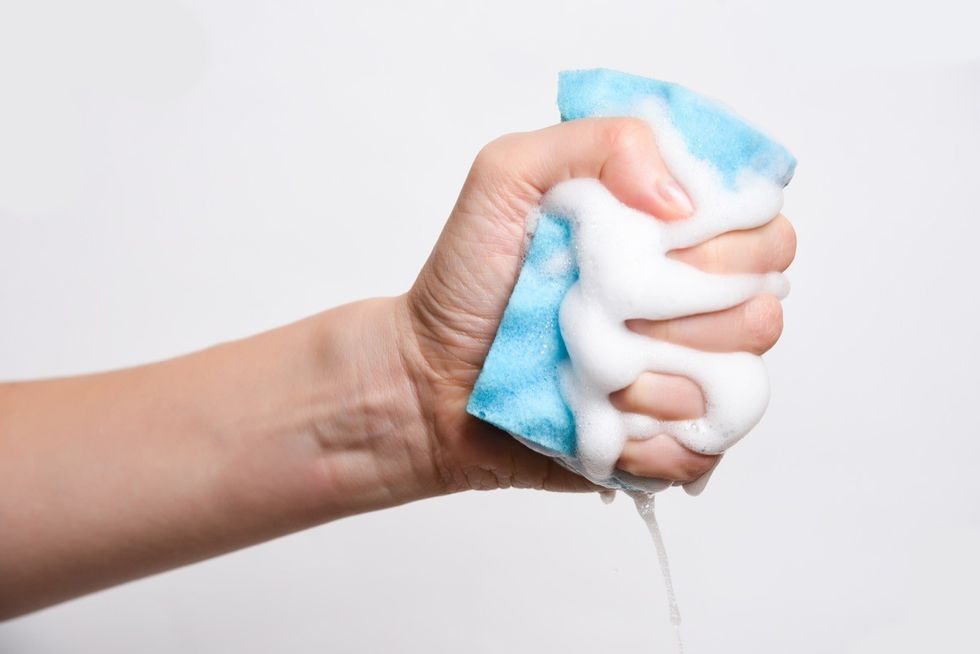Of all the areas in your home, the kitchen is notorious for having the most germs—yes, even more than your bathroom. “What’s dirtier than your toilet seat? Your kitchen,” says Dr. Reginald Nguyen, a family medicine doctor with Memorial Hermann Medical Group Sugar Land Primary Care. Cutting boards, counters, coffee makers, sinks… without proper cleaning, they quickly become breeding grounds for nasty bugs. But there’s one thing that’s probably teeming with bacteria this very second—your kitchen sponge. Yes, even if you regularly sanitize it. Here’s why.
RELATED: 7 Things Dirtier Than Your Toilet.
Sponges Are Never Dry
Shutterstock
Moisture and germs are best friends. “Salmonella and other bacteria grow and survive better in sponges than in brushes, the reason is that sponges in daily use never dry up,” research scientist Trond Mretr from Norwegian food research institute Nofima tells ABC7 News. “A single sponge can harbor a higher number of bacteria than there are people on Earth.”
Cleaning Problems
Shutterstock
Mretr’s study, published online in the Journal of Applied Microbiology, shows that it doesn’t matter how people clean their sponges, or how often—there are still germs on there. “The sponge is humid and accumulates food residues which are also food for bacteria, leading to rapid growth of bacteria,” Mretr says. “That the way the consumers used their sponges did not matter much regarding growth of bacteria. It is very difficult for consumers to avoid bacterial growth in the sponges as long as the sponges are not replaced daily.”
Hard-To-Kill Bacteria
Shutterstock
Markus Egert, a microbiologist at the University of Furtwangen in Germany, has also investigated how germy sponges can get. Dr. Egert discovered that even sponges that had been sanitized and microwaved still contained a bacteria called Moraxella osloensis, which may cause harm to those with compromised immune systems. “You should not become hysteric and afraid of your kitchen sponge now,” Dr. Egert tells The New York Times. “But if you’re already ill or have ill people at home, you should be more careful.”
Keep Sponges Away From Raw Meat
Shutterstock
There are ways to prevent particularly dangerous bacteria from getting into your sponges (remember, not all germs will make you sick). “If you’re dealing with raw juices from meat or poultry, you should be using paper that can be disposed of,” Jennifer Quinlan, a food microbiologist at Drexel University, tells NPR. “I replace mine every one to two weeks. That’s reasonable to me.”
RELATED: 6 Common Items Experts Say You Should Wash Before Using.
Cross Contamination
Shutterstock
The second that wet sponge is out of the sink and wiped across a counter, you have cross contamination. This is hard to avoid because what else is a sponge for but to soak up spills? And if you’re using the sponge with your bare hands, you’re spreading germs even more.
Use a Brush
Shutterstock
Mretr’s findings indicate a brush is better for cleaning, as it doesn’t store bacteria. “Since the brush dries very fast, harmful bacteria will die. Also, most brushes have a handle which prevents you from direct hand contact with potential harmful bacteria, in contrast to sponges. I encourage consumers to try a brush instead the next time they need to replace their sponge.” Other experts agree. “Brushes are the better choice to clean dishes, from an hygienic point of view,” Dr. Egert tells ABC7 News. “This might have been anticipated before, but the authors prove it with some nice experiments. However, based on my experience people love using sponges.”






